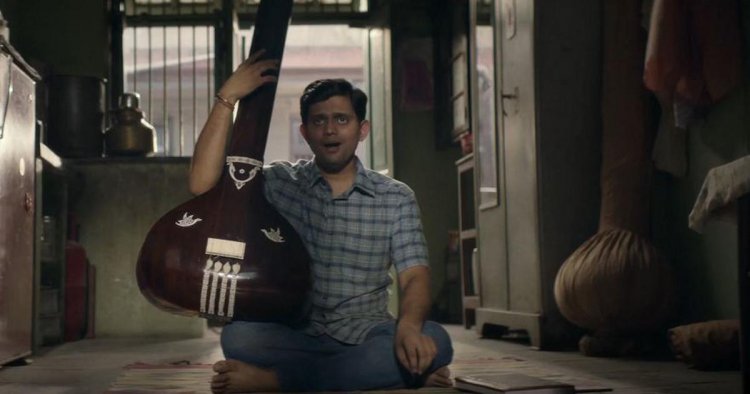The Disciple

Ratings: 3.5/5
Duration: 02 Hrs 07 Mins
Language: Marathi
Genre: Drama, Music
Director: Chaitanya Tamhane
Writer: Chaitanya Tamhane
Producers: Alfonso Cuarón, Tanaji Dasgupta, Vivek Gomber, Rakesh Mehra, Kishor Sawant
Music: Aneesh Pradhan
Cinematography: Michal Sobocinski
Editing: Chaitanya Tamhane
Art Direction: Sushant Sawant
Release Date: 30 April 2021 (India)
Released In: Netflix
Star Cast: Aditya Modak, Arun Dravid, Sumitra Bhave, Deepika Bhide Bhagwat, Kiran Yadnyopavit, Abhishek Kale, Neela Khedkar, Makarand Mukund, Kristy Banerjee, Prasad Vanarse, Ashwini Kulkarni
Plot: The Disciple tells the story of a man, Sharad Nevalkar (Aditya Modak) who devotes his life to become an Indian classical vocalist. He is devoted to his Guru (Arun David) who himself chose to live in oblivion, to not let his art be contaminated by western influences. His Guru’s Guru, Mai also walked on the same path. She is the voice-over who narrates lectures about the music and life of a musician through her recorded speeches throughout the film. Mai is voiced by late Sumitra Bhave.

Review: Directed by Chaitanya Tamhane, ‘The Disciple’ explores the degree to which a man devotes his life to Indian classical music and its rigorous practices. The film won Best Screenplay as well as the Fipresci Critics’ Prize at the 2020 Venice Film Festival.
‘The Disciple’ is an explanation of a beautiful quote by Thomas Merton, “Art enables us to find ourselves and lose ourselves at the same time.” It is about an artist who is self-doubting, proud and arrogant about it, at the same time.
It is not a territory no one has tapped into, nor is it a rag to riches story. The film does not intend to create a social message. It is purely about the artists who didn’t make it, not because they lost, but because they chose. And is simply a study of a character that is driven by his surroundings and commanders. Sharad Nevalkar's world is empty because he finds solace in listening to Mai’s decades-old recordings. But that does not mean he doesn’t want to touch the grass that is the greenest of the green on the other side!
For instance, the director pitches Sharad Nevalkar against another classical singer from Bengal who is appearing on a music reality show. Her rise and his downfall go hand in hand. While finding himself, and watching the notion bubble he has lived in a burst, Sharad sees the singer on the TV losing herself as she reaches the top. By the end, a shy girl singing classically at first is now a complete drag singing a forgotten Bollywood number. But still, she has a stage, and Sharad who stuck to his roots just had a handful of people. He envies the singer on the screen; he even doubts the talent he has polished since the age of 24. Hence, he is one amongst us. He is alone in the crowd but never standing out of it.
Aditya Modak, who plays the lead, is a trained classical singer and has made his acting debut. Not for a minute could you feel he is facing the camera for the first time! The film travels from his mid-twenties to his late thirties, to a bit of forties. As the year's pass, his body starts showing signs of ageing, and the actor manages to look the correct age every single time. He uses his physicality to bring Sharad alive and wins. In short, his command over his emotions, body language, and physicality is remarkable.
Even special mention must also be given to Arun Dravid as Guruji. Same is the case with Sumitra Bhave. She drives the narrative with her voice-over and shows us how even her presence with her voice can elevate a film.
The cinematography by Michał Sobociński allows the actor's character development and the scenes to feel natural. Especially, it is the flashback scenes that help us understand more how they shaped the protagonist's way of thinking. Also, how the transformation of Mumbai as a city is shown so deftly as the protagonist traverses the paths on his two-wheeler, is nice.
Music kicks in from the first second. There is silence, and the tunes of classical instruments hitting at the right time create a huge impact. Hence, ‘The Disciple’ works both as a tribute and a critique to Hindustani classical music. There are some lovely ragas strewn around in the film, but the song that comes at the very last scene of the film leaves it on a very poignant note.
Overall, if you are an admirer of classical music, then this is a must-watch!















































